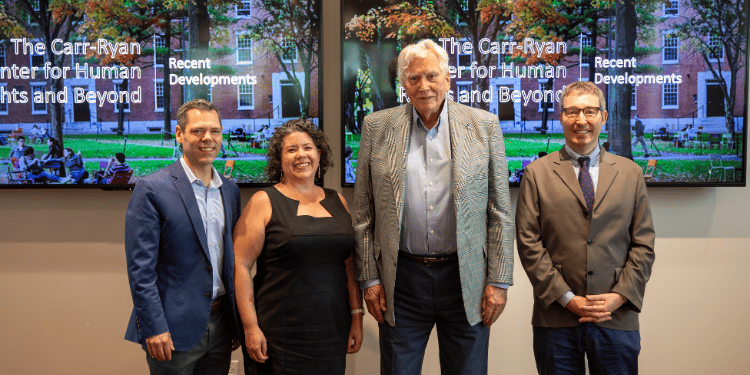Director’s Message: Human Rights are for Everyone

Reflections on the Occasion of the Renaming of Harvard Kennedy School’s Human Rights Center
The statement that human rights are for everyone very much guides the work of our center.
The Universal Declaration of Human Rights
The passing of the Universal Declaration of Human Rights (UDHR) on December 10, 1948, is among the most uplifting and perhaps most important events in the history of humanity. The document was a moral blueprint for the United Nations, which had been founded three years earlier. It offered the world a list of rights that were meant for everyone, and whose realization was a globally shared responsibility.
The statement that human rights are for everyone very much guides the work of our center. It is worth elaborating on this basic commitment and on some key events in the history of our center on the occasion we officially celebrate today, November 5, 2025—the renaming of the Carr Center for Human Rights Policy as Carr-Ryan Center for Human Rights.
The UDHR is the basic document of the human rights movement. In thirty articles many of which consisting of several paragraphs the UDHR lays out a vision for a decent human life: a life in which each person is provided with certain protections and with opportunities to obtain certain provisions. Each person is protected against a whole range of mistreatments—from sheer loss of life and torture to abuse of power in the courtroom. The provisions range from social security and an adequate standard of living to a right to work.
The commission that drafted the UDHR, under leadership of Eleanor Roosevelt, could have settled on a much shorter document, parallel to the Ten Commandments. Many people have learned the commandments by heart, few have done so with the UDHR. Many people quote from the Bhagavad Gita, Confucius’ Analects, or the Quran. Few quote directly from the UDHR. The UDHR is not just lengthy, it is also often clumsily worded. It is written in the heavy prose typical of committee work and lacks the literary grace, say, that Thomas Jefferson gave to the American Declaration of Independence.
But crucially, the UDHR is such a lengthy document because it is simultaneously a catalogue of things that have gone wrong in the world—not just during the Nazi era, which provides the immediate background, but throughout the Industrial age—and a detailed set of prescriptions of how we should do better. On both scores, there just is a lot to say.
In the decades following its passage, the UDHR has had a major impact in the world. In time it has led to the creation of numerous domestic and international civil society organizations, the best known among the latter being Amnesty International and Human Rights Watch. The human rights project of the 20th century that prepared the ground for the UDHR made sure that individuals were increasingly seen as such by international law—which traditionally had just been about states.
In other words, it was largely because of the human rights movement that international affairs have become not just a matter for states but also take seriously persons as such and associations of persons organized in something other than states. That is a major change compared to what had even counted as “international affairs” previously.
Human rights entered domestic legislation and constitution-making, in many countries gained a presence in foreign or commerce ministries and elsewhere in the government, gave rise to a broad range of international human rights law, and led to the creation of new institutions such as the International Criminal Court. For many millions of people human rights have offered hope for the future or inspired political activities.
What change human rights bring to the world must ultimately be measured in terms of what difference they make in the lives of people—in terms of what they do for the person on the ground. One important contribution of social scientific research in this domain is to assess just what kind and how much change human rights have brought. In the human rights world, the glass is half empty rather than half full—we see shortfalls more than achievements.
A cynical perspective might suggest that, in light of all the suffering in the world, the human rights movement could not have done much good. But for one thing, there is a good deal of suffering that only comes to broader attention because organizations and individuals who care about human rights make that happen.
More importantly, a moment’s reflection suggests that the world would be in much more dire straits were it not for the kind of political pressures the human rights movement at its best is capable of mobilizing. Again, it takes research to bear this out, but anyone who follows the work human rights organizations do around the world will likely find this thought immensely plausible. (On this score, I recommend reading Kathryn Sikkink’s Evidence for Hope: Human Rights Work in the 21st Century, or Ken Roth’s Righting Wrongs: Three Decades on the Frontlines Battling Abusive Governments.)
The Role of Human Rights Centers at Universities
Universities are one level removed from immediate impact on people’s lives, at least when it comes to the realization of human rights.
But universities too—especially their human rights centers—have an important role to play in the human rights world. One such center is the Carr Center for Human Rights Policy, whose renaming as Carr-Ryan Center for Human Rights we celebrate today.
Many human rights centers are based at law schools and focus on legal dimensions of human rights. Ours is based at Harvard Kennedy School (HKS), a school of public policy. The way I see it, its main mandate broadly is to do research on human rights—social scientific research to understand just how human rights have had an impact in the world; philosophical research to explore the nature and limitations of such rights; and research into human rights practices around the world to assess what has worked best and to spread such insights across organizations.
Another part of our mandate is to do events on human rights related challenges that arise around the world. Such events bring human rights themes to HKS and beyond and engage our community on them—to provide information, have critical debate, and attract people to human rights work.
Finally, our fellowship programs offer those who work in human rights opportunities to connect with each other and reconnect to universities. These programs build bridges between the university and organizations out there that work on human rights. Harvard possesses a great deal of convening power, and we are eager to lend this power to human rights causes.
The United Nations has adopted the UDHR as its moral blueprint, and thus it behooves a policy school with as global an orientation as HKS to engage with human rights in such ways. It also behooves a distinguished university such as Harvard to be connected to this important milestone in the history of humanity.
Renaming Our Center: Celebrating Vin Ryan
It is in honor of Vincent J. (Vin) Ryan that today we celebrate the renaming of the Carr Center for Human Rights Policy as Carr-Ryan Center for Human Rights. Vin is a long-standing supporter, long-time chair of the advisory board, and now emeritus chair of this board.
Vin Ryan has made his impressive career in business, as chairman of Schooner Capital, LLC, a venture capital firm founded in 1971. Perhaps most prominent among the companies Vin founded is Iron Mountain, a global provider of information management services.
Vin’s life has all along been a life in and for human rights…It took a lot of courage to stand up for human rights precisely when they started to come under attack, also and especially at Harvard.
Ryan is also president of the Schooner Foundation, whose philanthropic work supports domestic and international organizations in human rights, social justice, global health, education, and conservation. Schooners, I should perhaps explain, are agile sailing vessels rigged with fore-and-aft sails running along the length of the ship. Historically used for sea-faring activities such as fishing and cargo, these ships are known for their speed, efficiency, and adaptability. They provide apt inspiration for the work Vin has done both in business and in philanthropy.
Human rights permeate the story of Vin’s life—beginning with the inspiration he got from his father, the only one in his family who got a higher education, became a doctor, and treated people in need regardless of means so that they could live in dignity. Subsequently, Vin’s success in business was always guided by the desire to do right by people, to enable people, to build something for and with people. People came before profit, relationships were built for the long term, and creating trust mattered. Vin is known for having a talent for seeing potential in people, for sending them the right way to realize their potential, and for waiting for the right moment to invest in what they might do.
Vin would explain to his family and friends that his pursuit of wealth was not for its own sake, but for the autonomy he would have over his own life if he was financially successful. Such autonomy also enabled him to pursue his political and moral causes. Some of these causes were about making sure that others too could obtain a much higher level of autonomy than otherwise they would have.
So Vin’s life has all along been a life in and for human rights. His philanthropic work, in the human rights field and elsewhere, has been about putting money to work to foster causes that have also always underwritten his business practices. In this way, as those familiar with philanthropy will realize, Vin’s understanding of philanthropy and its integration with his business is quite distinctive. His business partners too understood that investing in Schooner Capital also ultimately meant investing in the Schooner Foundation.
In recent months, other major actors in philanthropy have slowed down to wait and see how the world would change. That was not Vin’s approach. He realized that our center needed an increased endowment to maintain its basic functionality in the long run. He also realized that the political circumstances that had arisen in spring 2025 required a strong response especially from philanthropy. It took a lot of courage to stand up for human rights precisely when they started to come under attack, also and especially at Harvard.
Vin has supported our center in numerous ways before. In particular, we are proud to have the Ryan Family Chair in Human Rights Policy at HKS. Over the last decade, this chair has been held by Kathryn Sikkink, a key faculty member at our center, and one of the most distinguished political scientists working in the human rights field. Her recent focus has been on transitional justice but also on the role of responsibilities in the human rights domain.
Over the next several years, Vin Ryan’s gift of $10 million will be added to our endowment. This gift makes sure that HKS will be able to do human rights work as long as there is an HKS. Without this gift, that would not be the case—and that indeed is how important this gift is.
We are enormously grateful to Vin Ryan for stabilizing Harvard’s human rights work in perpetuity.
A Very Brief History of the Center
More than twenty-five years ago, the impetus to create a human rights center at HKS came from alumnus Greg Carr, who gave the original endowment and thus made it all possible. In recent times, Greg’s energies have focused on rebuilding a large national park in Mozambique, Gorongosa.
Greg found an early ally in Graham Allison, the founding dean of the current incarnation of HKS and at the time the director of the Belfer Center for Science and International Affairs. Joseph Nye was the dean back then, and it was he who officially created the Carr Center for Human Rights Policy at HKS in 1999.
Greg Carr’s and Graham Allison’s good judgment led them to hire Samantha Power as the center’s founding executive director. A good deal of center energy in the first few years went into the completion of a book that would make Samantha famous: A Problem from Hell: America and the Age of Genocide.
As founding director HKS appointed Michael Ignatieff, whose research back then explored how to make sense of American Exceptionalism a decade after the Cold War.
These wise choices in selecting the original leadership meant that the Carr Center became highly visible very quickly.
After Michael and Samantha had left to pursue political careers, new directors and executive directors continued the work. Each of them brought priorities of their own, though one can look back at the history of the center and find that the three dimensions—social-scientific, philosophical, and practice-oriented work—were always present.
Sarah Sewall served as Acting Director for several years and brought a focus on human rights and military engagements. She was succeeded by Rory Stewart, who built a program on Afghanistan and Pakistan. Later Doug Johnson was appointed and created a program on the consequences of torture. I was appointed in 2018, and my own priorities as director have been on technology, racial justice, the realities of human rights in the United States, LGBTQI+ human rights, as well as human rights and American foreign policy.
Each director, that is, brought priorities that reflected the urgent human rights issues of the time. Over the years, the directors have been supported by executive directors Michele Greene, Fernande Raine, Lois Andreassen, Charlie Clements, Sushma Raman, and now Maggie Gates. Taken together, Charlie Clements and Sushma Raman served in their roles for half of the time the center has existed and thus have left an especially deep mark on its work.
During this time many other things have been going on in the center other than work reflecting the priorities of the director. The center has hosted programs on human rights and social movements, human trafficking and modern-day slavery, responses to mass atrocities, national security and human rights, renewing human rights in times of waning concern for them, measuring human rights, the human right to water, etc. Our events coverage has been even broader.
Overall, we are trying to combine a research focus on specific areas with a broader mandate to keep the human rights perspective visible in our community. Our goal is to do human rights work with integrity, in every aspect of the work as I have now described it.
Human Rights are for Everyone—Across Boundaries Between Conservative and Liberal Supporters
Human rights indeed are for everyone—that is the theme with which I began, and I would like to close with it as well. That is not to say that there have not been controversies about the intellectual or political viability of human rights, or about just what should be in the scope of human rights.
Wherever one finds oneself on these particular matters, the fact that there is this scope of disagreement among supporters also implies that there is a broad coalition backing the core ideas behind human rights
For some decades after the passing of the UDHR a conservative take on human rights was that they should be limited to civil and political rights and not include social, economic and cultural rights at all.
This is a position that in recent times relatively few people have taken. (Aryeh Neier’s 2012 book The International Human Rights Movement: a History, is one influential recent articulation.) Still, these days there is some controversy on topics such as how to connect climate change and human rights (and thus whether environmental matters are best addressed through a human rights lens), whether LGBTQI-causes are best addressed in terms of human rights or might rather be matters of domestic civil rights, as well as on what the role and relevance of international institutions should be in realizing human rights.
Wherever one finds oneself on these particular matters, the fact that there is this scope of disagreement among supporters also implies that there is a broad coalition backing the core ideas behind human rights—that each person be provided with certain protections and with opportunities to obtain certain provisions, and that, one way or another, doing so is a globally shared responsibility.
It would be such a global responsibility because human rights at any given place are best protected if they are protected by efforts to realize them everywhere. Moreover, it would be such a responsibility also because human beings possess human dignity wherever they live—and while distance and other factors have a lot to with questions around who needs to do what for human rights, enabling people to live up to their own dignity must be a global concern.
In these precarious times when human rights come under attack in many ways I hope, and I think, that what I just stated is a platform on which indeed a great many people and organizations can stand together to work towards the realization of the promise held out in the UDHR. Intramural debates will remain. But they should not prevent us from seeing our shared commitments with everyone who believes that human rights are for everyone.
Source link




